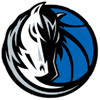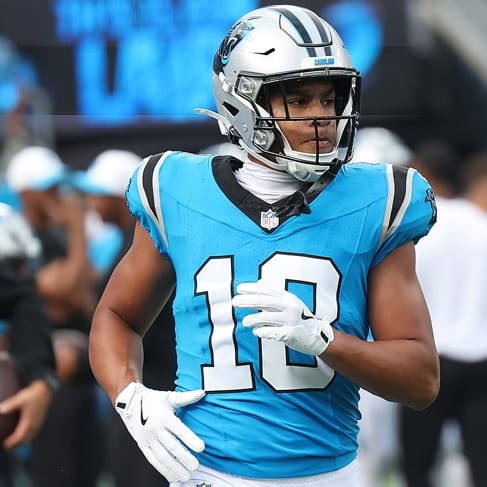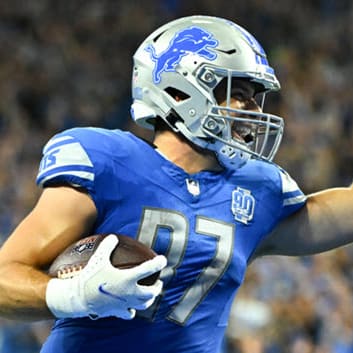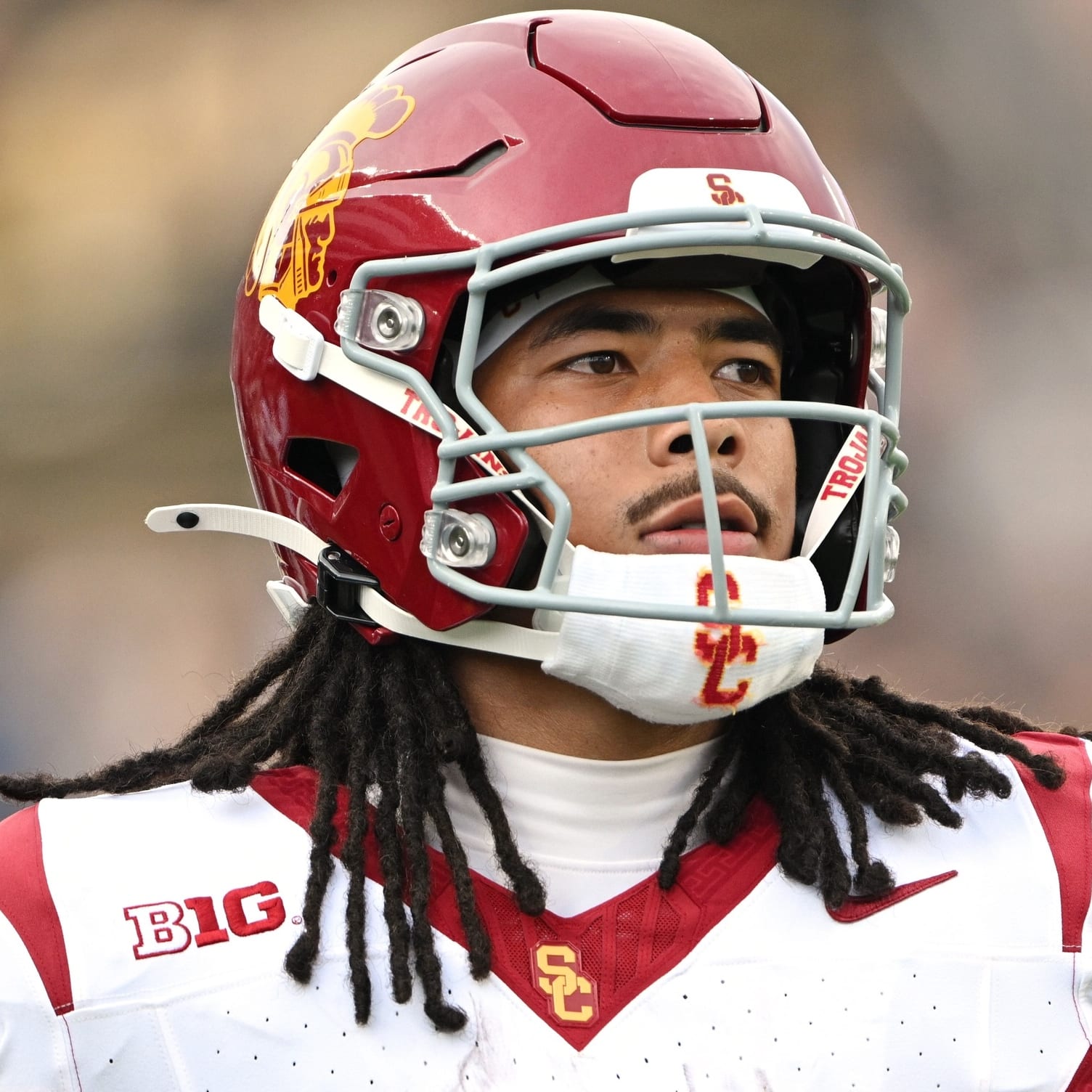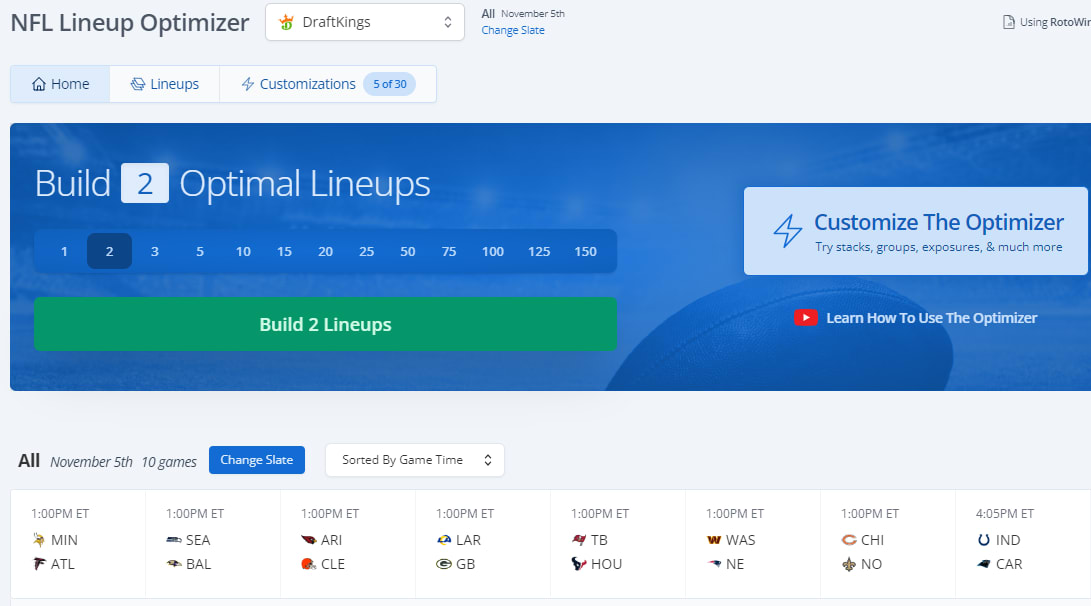Rashid Shaheed is not your conventional NFL prospect. He's not even your conventional fringe prospect. His prospect profile is full of details that would normally warrant red flags: old (24) for his class, ambiguous production at a low level of competition, and no workout testing metrics to measure his athleticism. As a prospect in the 2022 class Shaheed's best selling point was his kick return production at Weber State. Almost everything else was a negative.
Yet Shaheed's rookie season with the Saints was consistently impressive, and his production was strong to the point that it's time to largely rewrite his prospect profile. Perhaps Shaheed would be an anomaly to succeed as an NFL starter with his prospect profile, but the 2022 season gives compelling reason to consider that possibility real anyway.
If Shaheed does prove to be such an anomaly then he'll also potentially prove a profiting opportunity for dynasty owners who manage to acquire him on the cheap. Because Shaheed is undrafted and has a conventionally bad prospect profile, a lot of dynasty players with Shaheed shares might be looking to Sell High on him while following the conventional reasoning that his poor pedigree means he can't sustain his good 2022 production. To a lot of players Draft Capital is the almost sole measure of prospect value, and such people might be open to handing Shaheed over for cheap.
INTEL
College Production
Normally a player at the Weber State level needs to provide plainly dominant production to so much as blip the radar of the NFL, and that becomes even more the case when a prospect is over-aged, which Shaheed was as a 24-year-old rookie. Shaheed's collegiate production fails to meet that mark, but upon closer look there are positive indicators that go unnoticed at a glance. In particular, Shaheed had injury disruptions stall his progress at points where he otherwise was on track to approach that dominant standard we want to see in a small-school prospect. As much as we like to see plainly excellent production in prospects, sometimes circumstances get in the way and provide a legitimate excuse for any failure to do so. Shaheed might be one of those cases.
The main thing missing from Shaheed's collegiate production is volume. His career high in receiving yardage was 700 yards in 11 games in 2021, a figure cheapened by the fact that he was 23 years old at the time – an age at which the vast majority of viable prospects have already been in the league, sometimes for two years. That 700 yards was a bigger contribution than it initially looks since it was 29.4 percent of Weber State's passing yardage in 2021, but it's still not enough to stand out at the age he was.
What's definitely noticeable about Shaheed's collegiate production is the fact that he's one of the best kick returners in college football history. He averaged 29.1 yards per return over 88 attempts, scoring seven touchdowns. Whatever else might be true about Shaheed, this is someone who can run with the football. The question with a player like him is how easily you can get him the ball. Open-field running ability is real currency in itself, but the question of whether Shaheed could apply those abilities from scrimmage isn't clear from special teams work alone. The good news is that, while Shaheed's from-scrimmage production lacked dominant volume, he was always a steady contributor when healthy, including a true freshman season where he produced 679 yards from scrimmage (545 receiving) in 11 games. He placed third on the team in receiving yardage that year, behind Drew Batchelor and Andrew Vollert, both of them seniors. Vollert was one of the most productive receiving tight ends in college football from 2016 to 2017, so for Shaheed to vaguely keep up with those two as seniors makes Shaheed's true freshman season a positive data point, even if it lacks volume.
The theme from Shaheed's true freshman season continued in his other four years. As a sophomore he led the team in receptions with 41, but then-senior Darryl Denby's 541 yards outpaced Shaheed's 442. Shaheed never secured standout volume but he was again a steady contributor. Notably, that 2018 sophomore season showed him demonstrating the ability to play a possession wideout role underneath, a crucial detail to unleash his after-the-catch ability. That Shaheed couldn't take more volume from Denby, a fourth-year player, might be excusable especially given that Shaheed had the reception lead. Denby clearly had more downfield opportunities while Shaheed held down the underneath routes, but that doesn't mean Shaheed couldn't have made those same plays downfield. If Denby hadn't been on the team or had just been two years younger, in other words, Shaheed might have posted production both underneath and downfield, thus securing that elusive breakout receiving volume as a true sophomore and drastically changing his prospect profile in the process.
Athletic Testing
Shaheed has two ACL tears in his career, one of which occurred in the final game of his Weber State career. The second injury prevented him from participating in any athletic testing leading up to the 2022 draft. This was a problem – it would be easier to excuse Shaheed's underwhelming production and the facts that he is both old for a prospect and smallish (5-foot-11, 185 pounds) if Shaheed had at least been able to post strong athletic metrics in a pro day setting, but instead Shaheed headed into the NFL small, undrafted, over-aged and with a complete N/A for his athletic profile.
With that said, there is separate evidence that Shaheed possesses uncommon speed. He was a standout track athlete in the San Diego area in high school, to the point that he was ignored as a football recruit because he was assumed to be a track-only athlete. Shaheed otherwise estimates he'd run in the 4.3 or 4.4-second range (https://saintswire.usatoday.com/2022/10/20/pete-carmichael-saints-rashid-shaheed-quotes-weber-state-nfl/).
If Shaheed has sub-4.45 wheels then that's enough to put him on the NFL radar for his return ability alone. It's also sufficient speed to consistently, credibly threaten downfield against press coverage. If Shaheed is fast enough to win downfield then that gives him a second dimension to play off the underneath threat he otherwise poses, which could be enough to make him a viable starter.
NFL Production
His ambiguous from-scrimmage production at Weber State doesn't offer much insight on whether Shaheed would conventionally project for work on offense, which is part of why it was so fascinating when Shaheed posted standout production week after week as a rookie in 2022 once he returned from his second ACL tear. The collegiate production was unclear at best, but Shaheed's NFL production was plainly promising, to the point that it warrants revising Shaheed's prospect profile. Just as the background reporting on Shaheed's 40 time checks the box for the tool set question, Shaheed's rookie year production significantly improved the skill set variable in his profile.
Shaheed was an instant hit for New Orleans upon his return from injury in Week 6. He played only nine snaps and didn't catch his only target, but he did run for a 44-yard touchdown on his first NFL carry. The next week was eerily similar: just 10 snaps and one target, but one caught for a 53-yard touchdown. The third game was less explosive but subtly encouraging all the same: three catches for 38 yards on three targets and 14 snaps. In his first three NFL games, on 33 snaps, Shaheed had produced 135 yards and two touchdowns from scrimmage. Shaheed cooled off as he would only play 11 snaps over the next two games, but then he started to muster a second wind beginning in Week 11. While Shaheed had just an eight-yard reception on two targets against the Rams that week, he also set a career high with 27 snaps. Shaheed was about to get his first test in a starting role. The way Shaheed produced from that point added more encouragement yet to his prospect profile.
From Weeks 12 through 18 Shaheed logged 221 snaps. In those six games he drew 26 targets, 22 of which were caught for 377 yards and one touchdown. That's a catch rate of 84.6 percent at 14.5 yards per target – blistering efficiency. Shaheed of course can't maintain that pace forever, but his peripheral stats were dominant to the point that he also could easily withstand regression. He could forfeit upwards of 15 catch percentage points and 7.0 yards per target and still provide above-average returns.
Crucially, Shaheed demonstrated big-play ability both underneath and downfield, meaning he can credibly threaten against multiple defensive looks. Shaheed showed with his high catch rate that he can threaten consistently underneath, something he also did at Weber State. If Shaheed can consistently threaten underneath then defenses won't be able to neutralize him with a cushion. If defenses try to press or crash toward Shaheed to cut off the after-the-catch threat underneath then they raise the risk of Shaheed running past them for a big play downfield, which he was also adept at as a rookie.
2023 Projection
Based on his career production and suspected athletic testing there is reason to believe Shaheed can function as an average or better top-three receiver for an NFL team, presenting big-play ability both downfield and after the catch to make the most of modest target volume. That Shaheed never posted good age-adjusted production at Weber State makes it unlikely he improves meaningfully on his rate of 34 targets on 292 snaps. That he'll turn 25 in August indicates it's unlikely that Shaheed's skill set grows from this point – he is likely fully developed or close to it.
Shaheed might not need to improve at all, though. His reliability underneath and after-the-catch ability make him a viable contributor for most types of slot reps, and he repeatedly showed downfield ability from outside reps, including torching standout boundary corners James Bradberry and Jamel Dean for big gains down the sideline. Beating Dean in particular lends credence to the idea that Shaheed has 4.40 or even sub-4.40 speed, as Dean ran a 4.30-second 40 at 206 pounds.
That Shaheed went undrafted is not a good indicator for his long-term job security, but the Saints have no first-round pick this year and could use a cheap contributor like Shaheed given what they traded to acquire Olave. Shaheed conclusively outranked 2021 starter Marquez Callaway and former third-round pick Tre'Quan Smith on the depth chart to finish the 2022 season, so if anyone is going to knock off Shaheed from his 2022 role it will likely have to be from the third round onward or perhaps free agency. The Saints have one of the worst cap situations in the league, so the chances of them spending at receiver don't seem great, and particularly if the Saints cut Michael Thomas then Shaheed would go from a three-wide player to potentially a two-wide contributor for the Saints.
As a rookie Shaheed produced 28 receptions for 488 yards and two touchdowns on 34 targets while running for 57 yards and a touchdown on 292 snaps. The 82.4 percent catch rate and average of 14.4 yards per target are not sustainable – something like a 68.0 percent catch rate at 8.5 yards per target would be plenty acceptable in a three-down role. When prorated over 800 snaps Shaheed's target rate would project for about 93 targets. At the previously mentioned catch and YPT rates 93 targets would equal about 63 receptions for 791 yards and five touchdowns.
Granted, 791 yards and five touchdowns won't be the hinge on which anyone's dynasty league fortunes swing, but if it's sound as a mid-range projection then it's worth considering what might happen if the upper-range outcomes occur. For instance, it's not truly a given that Shaheed can't draw more targets per snap and if he did, the swing could prove momentous when we're talking about explosiveness like Shaheed has shown. It's also not a given that his catch rate and YPT figures respectively fall to 68.0 and 8.5 – that's a major departure from 82.4 and 14.4. Nor is it a given that Shaheed play only 800 snaps as opposed to 900 or 950, especially if Thomas gets cut.
If this range of outcomes is soundly projected then Shaheed is likely undervalued in many formats. He should be good depth at the least and in the event that he slightly increases his target rate or stumbles into improved quarterback play there is room for real upside. Shaheed has consistently shown great hands and the ability to convert usage underneath, which amplifies his standout abilities after the catch. Shaheed has shown legitimate burning speed which gives him a credible ability to threaten downfield from boundary alignments. His open-field running abilities could demand consistent rushing opportunities to pad his numbers a bit, too. Shaheed is very likely a good player, so dynasty speculators should consider his price now versus what it would look like if he vaguely maintains his current course.





